- Author Matthew Elmers [email protected].
- Public 2023-12-16 21:49.
- Last modified 2025-01-24 09:17.
The fate of the Egyptian queen Cleopatra is like a ready-made script for a theatrical stage, it is so unusual that it seems that there is no need to invent something: there was enough material for dozens of plays, novels and films, starting with Shakespeare's masterpiece and ending with the famous film by Joseph Mankiewicz starring Elizabeth Taylor.
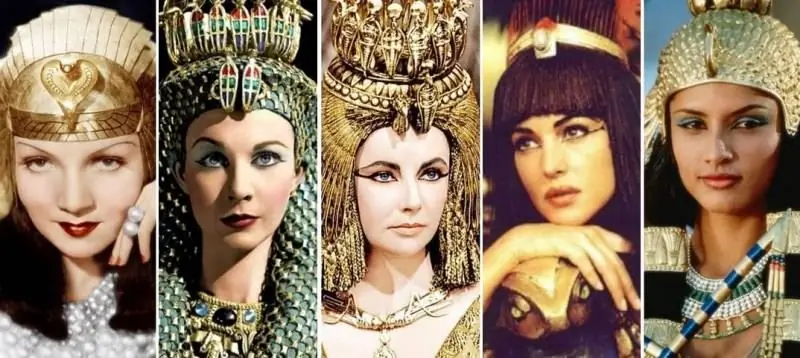
Performers of the role of Cleopatra: far left - Claudette Colbert, 1934, then - Vivien Leigh, 1945, Elizabeth Taylor, 1963, Monica Bellucci, 2002, Leonor Varela, 1999
Nevertheless, the laws of the genre and artistic expediency require adherence to a certain scheme, "unnecessary" facts that do not fit into such a scheme are usually ignored by the authors. The most famous Hollywood film about Cleopatra, shot in 1963 by Joseph Mankiewicz, begins as a textbook on history, but the further the action develops in it, the more liberties the authors take, and in the finale it already differs little from the others, from a historical point of view much less bona fide works. As a result, we have a kind of myth that has become entrenched in the public consciousness, and Cleopatra has become more a literary character than a real historical person.
First of all, it should be said that Cleopatra was not Egyptian by birth and had nothing to do with the previous dynasties of the pharaohs. From 323 BC Egypt was ruled by the Hellenistic dynasty of the Ptolemies, founded after the death of Alexander the Great by one of his generals - Ptolemy Soter (Guardian). The capital of the Ptolemies - Alexandria, surpassed Rome of that time in size and accumulated wealth (it was still "brick", "marble" it would become in the time of Octavian Augustus). The Egyptian capital of the time of Cleopatra can only be compared with Athens of the Classical period of the history of Ancient Greece - adjusted for the scale, of course. The population of Alexandria was mixed: Macedonians, Greeks, Jews and Egyptians lived in the city (modern Copts are the descendants of the indigenous Egyptian population). You could also find Syrians and Persians in it. In addition to Alexandria, there were two more "Greek" policies in Hellenistic Egypt: the pre-existing colony of Navcratis (in the Nile Delta) and Ptolemy I Ptolemais founded (in Upper Egypt). Ancient Egyptian cities such as Memphis, Thebes, Hermopolis and others did not have self-government rights.
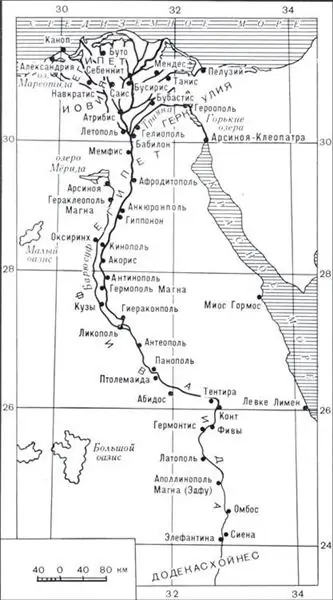
The main god of Hellenistic Egypt and Alexandria was Serapis, depicted as a bearded man in a tunic with a kalaf (measure of grain) on his head. Most researchers consider this cult syncretic (that is, holistic, but consisting of heterogeneous elements), invented by Ptolemy I to unite the newcomer Greeks and Macedonians and their Egyptian subjects. Supporters of this point of view find in Serapis the features of such gods as Osiris, Apis, Hades and Asclepius. But some consider Serapis to be a Babylonian god, or one of the hypostases of Mithra. Even Plutarch and Clement of Alexandria (150-215 AD) did not come to an unambiguous opinion about the origin of this cult, who in their works set out several versions at once. After the annexation of Egypt by Rome, the cult of Serapips spread widely throughout the Empire, his temples were found even in the territory of modern England. Indirect evidence of the popularity of this cult is the words of Tertullian (II-III centuries AD) that "the whole earth swears to Serapis."
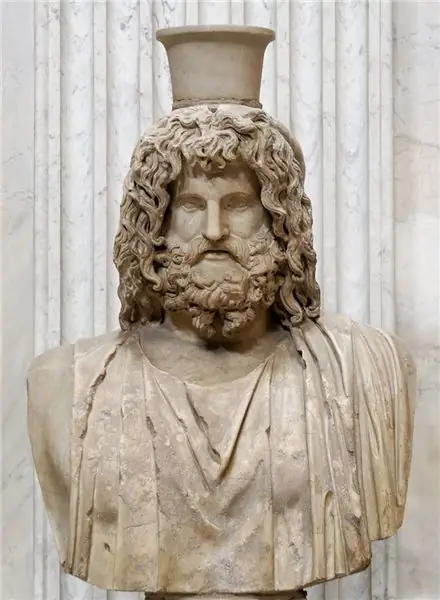
Serapis, bust, marble, Roman copy after a Greek original, 4th c. AD
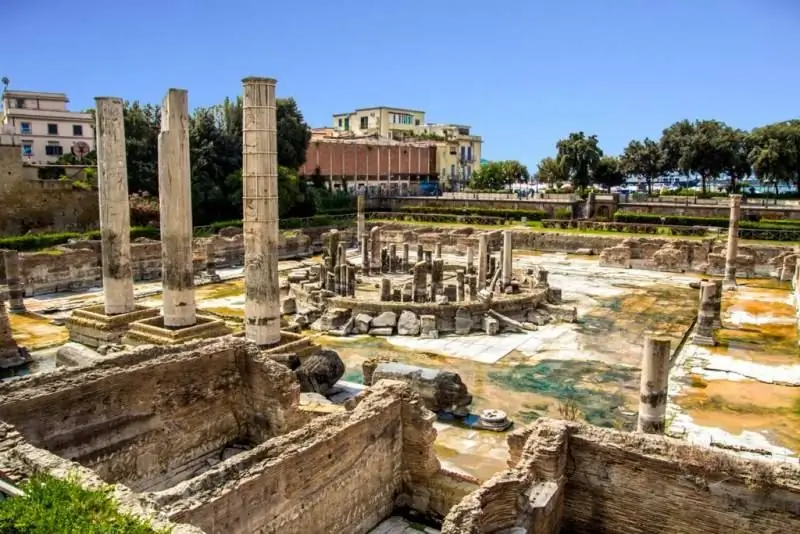
Ruins of the Temple of Serapis in Alexandria
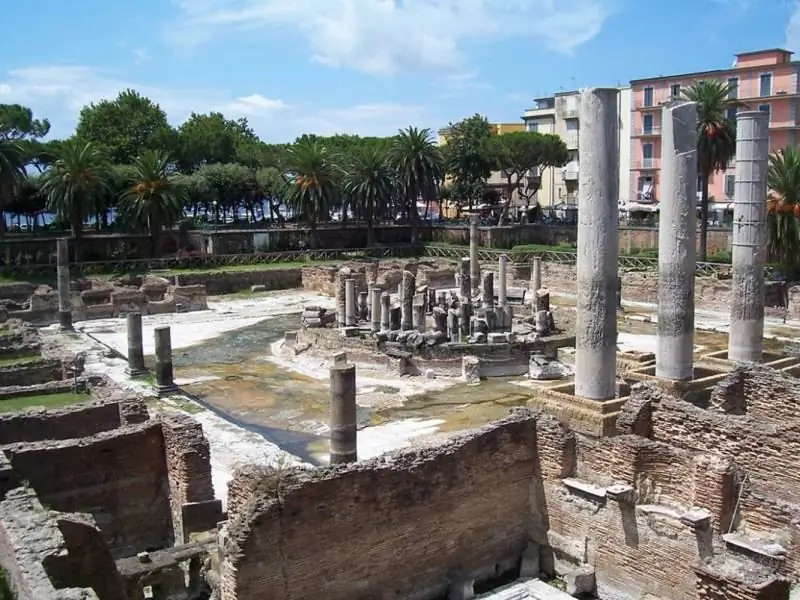
Ruins of the Temple of Serapis in Pozzuoli, Italy
The Ptolemaic army was traditionally formed from Macedonian and Greek mercenaries. As for the indigenous population of Egypt, its position changed little under the Ptolemies; for the most part, the local Egyptians were engaged in agriculture and, in fact, were in the position of state serfs.
Imitating the pharaohs, in order to preserve the "purity" of the royal blood, the rulers of Egypt married their sisters. In the palace they spoke only Greek, and therefore Cleopatra was Macedonian by blood, and Greek by upbringing.
Shakespeare, describing Cleopatra's appearance, used the expression "cute gypsy face" (no more, no less!). It is not surprising that all the actresses who play the role of Cleopatra traditionally present her to us as a burning brunette (after Elizabeth Taylor, even I cannot imagine her in another way):
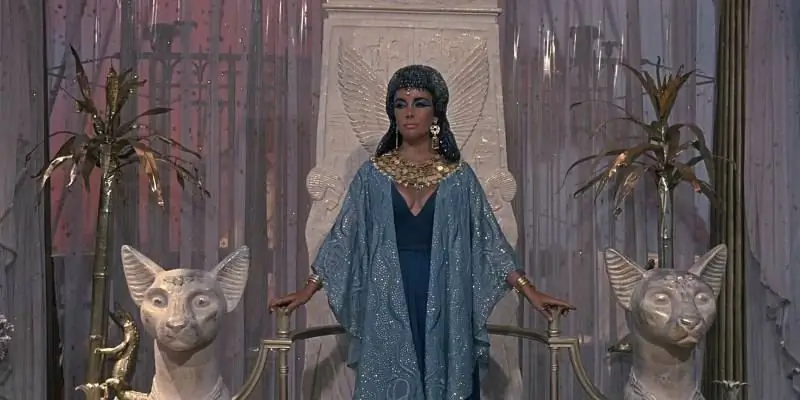
E. Taylor as Cleopatra, 1963
However, given the origin of our heroine, it can be assumed that, in fact, she was blonde with blue or gray eyes - the Macedonians of those years had blonde hair.
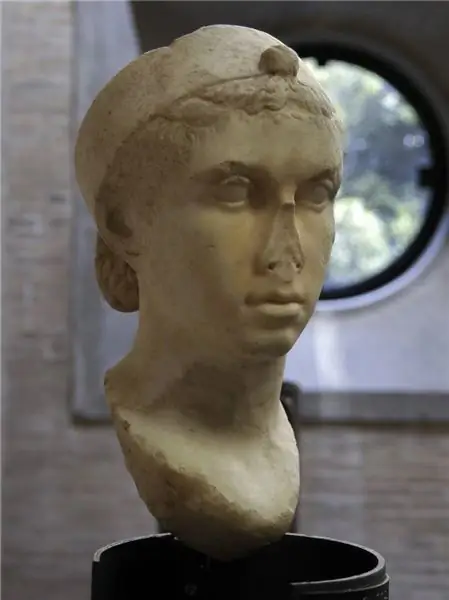
Sculptural portrait of Cleopatra, marble, Vatican Museums. Agree, this girl in a lifetime portrait is easier to imagine a blonde than a brunette
The most famous example is the appearance of Alexander the Great. Here, Plutarch, for example, writes about Pyrrhus:
"They talked a lot about him and believed that both by his appearance and by the speed of his movements he resembled Alexander … everyone thought that they were looking at the shadow of Alexander, or his likeness …"
And Pyrrhus, as you know, was red-haired. Consequently, Alexander also had red hair. And there is no reason to think that his closest friends and associates (among whom was Ptolemy) were sharply different from him - in this case, contemporaries would not fail to note the uniqueness of his appearance, and sycophants would use a "non-standard" and atypical hair color as one of the proofs of the divine origin of the conqueror.
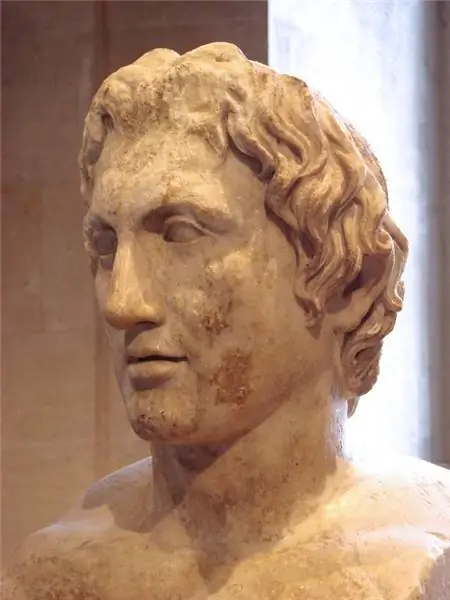
Running a little ahead, let's also say about the appearance of Roman women who will be mentioned in this article - Fulvia, two Anthony, Octavia. Many researchers believe that among the women of Ancient Rome of the Republic period there were many blondes, whose hair color was a reddish tint. After mixing the indigenous Roman population with numerous immigrants from the colonies, such hair began to be considered a sign of aristocratic origin, and women all the time tried to reproduce the previous color. There were two recipes. The richer women rubbed their hair with a mixture of soap made from goat's milk (it was borrowed from the Gauls in the 1st century AD) and the ash of a beech tree, after which they sat with their bare heads in the sun all day. The richest also applied gold powder to their hair. The poor, on the other hand, poured bull urine on their hair - and, again, went to the sun. Fashion survived the collapse of the Roman Empire, and the above methods of making your hair look like "real Roman women" were known even during the Renaissance. We can now see this special, golden-red hair color in all the women depicted in Titian's paintings: this shade was later called "Titian hair". Look, here is the hair that many women of Ancient Rome could have:

Titian, fragment of the painting "Earthly Love and Heavenly Love"
Hair of exactly this color, according to Michelangelo, should have been in Cleopatra:
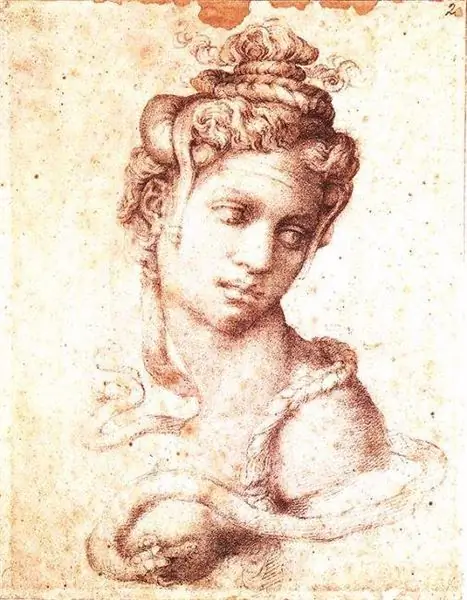
Michelangelo, "Cleopatra", 1533-34
Modern chemistry also offers dyes labeled "Titian", but they usually fail to achieve a real "Roman" shade with their help: the hair turns out to be too bright, too red, look unnatural, and sometimes even vulgar.
But back to our heroine. The name Cleopatra means "Glorious by her father", she wore it the seventh in a row in her family, was the daughter of Tsar Ptolemey XII, whose inclinations are given by his nicknames. whose nicknames give an idea of his inclinations. The first of them is "The Flutist", and even more contemptuously - "The Piper": playing the flute was not considered an occupation worthy of a king. The second - "New (or" Young ") Dionysus", speaks of this king's passion for religious mysteries.
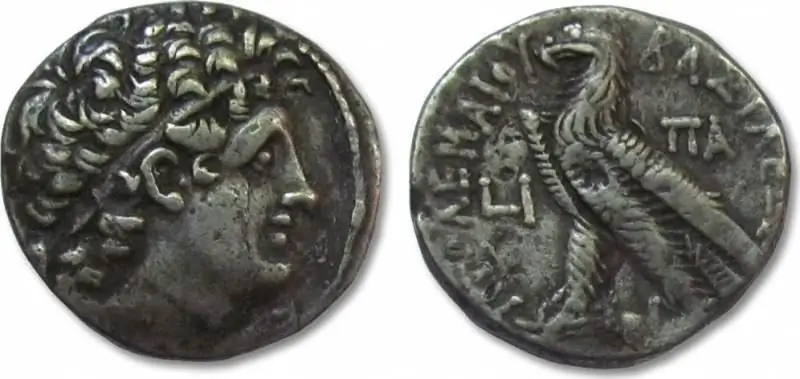
Tetradrachm of Ptolemy XII
You may have heard more than once how a crowd of Egyptians dealt with a Roman who killed a cat - this story, taken from the writings of Diodorus of Siculus, is constantly reproduced in various articles about the worship and deification of cats in Egypt. It happened just during the reign of Ptolemy XII - about 66 BC.
This speaks, on the one hand, of the hatred of the common people towards Rome and the Romans, who actually controlled everything in Egypt and were looking only for an excuse for the final subordination of the country, and on the other hand, about dissatisfaction with Ptolemy, who made any concessions to Rome, just not to provoke him to a direct attack.
Cleopatra is not the only child in the family, she had two brothers and three sisters: her own and two half-brothers (from her father's first marriage). It was the rebellion that brought Cleopatra's half-sisters to power - Tryfaena (she could also be the wife of Ptolemy) and Berenice - that gave rise to the intervention of Rome in the affairs of Egypt. The reason for the uprising was the capture of the island of Cyprus by Rome, where Ptolemy's brother ruled (58 BC). The attitude of Roman officials to the "friends and allies of the Roman people" is eloquently evidenced by the meeting of Ptolemy and Mark Portius Cato the Younger (at that time he was a quaestor with the powers of a propraetor) on the island of Rhodes: Cato received the king of Egypt, who had recently sent his troops to help Pompey, who fought in Palestine, "sitting on a toilet seat and emptying the intestines." I would like to believe that Marie Yovanovitch behaves more decently in Kiev.
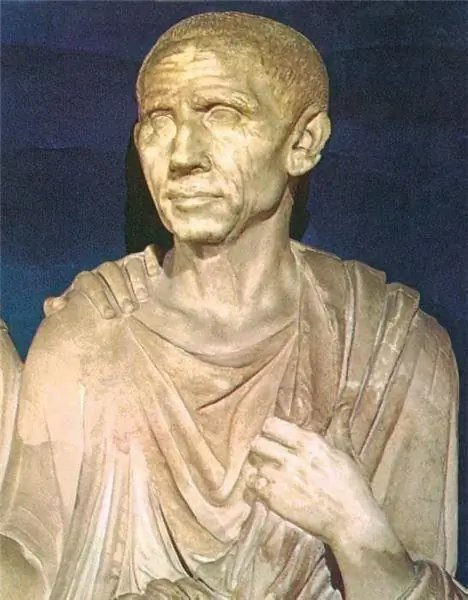
Marcus Porcius Cato the Younger
In Rome, they nevertheless decided to help Ptolemy return the throne of Egypt, but the strength of the bureaucracy was such that for three whole years in the Senate they could not decide which of the generals to send to "restore order" in Alexandria. In the end, the Roman governor in Syria, Aulus Gabinius, unauthorizedly sent troops to Egypt, which suppressed the rebellion and restored Ptolemy to the throne (contrary to the well-known saying, the winner in Rome was tried and brought to ruin by a fine of 10,000 talents). Tryfaena was fortunate enough to die before defeat, and Berenice was executed by order of her father. The young commander, who commanded the Roman cavalry on that campaign, apparently heard a lot about the beauty and talents of the eldest of the surviving daughters of the king - of all the children of Ptolemy, he wished to see only her. This is how Mark Antony and Cleopatra, who at that time was barely 14 years old, met for the first time. Antony later claimed that he fell in love with Cleopatra from that first meeting.
Here is how Cleopatra and Plutarch describe in their "Biographies":
"The beauty of this woman was not what is called incomparable and strikes at first glance, but her appeal was distinguished by irresistible charm, and therefore her appearance, combined with rare convincing speeches, with tremendous charm that shone through in every word, every movement, firmly cut into soul … They said that she learned many languages, while the kings who ruled before her did not even know Egyptian, and some forgot Macedonian."

Cleopatra, bust, granite, Royal Ontario Museum
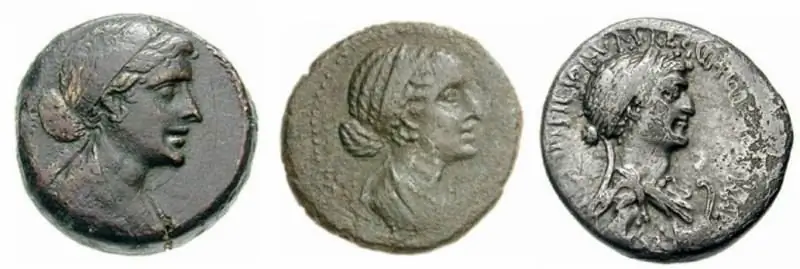
Portraits of Cleopatra VII on various coins minted during her reign
Communication with clever and charming Cleopatra made such an impression on Mark Antony that he began to look for a new meeting, and this led the royal court into confusion - an unremarkable young Roman "general" of plebeian origin, apparently, was not considered a suitable party for an Egyptian princess. The princess's educator, the eunuch Apollodorus, did everything possible to prevent a new meeting under various pretexts.
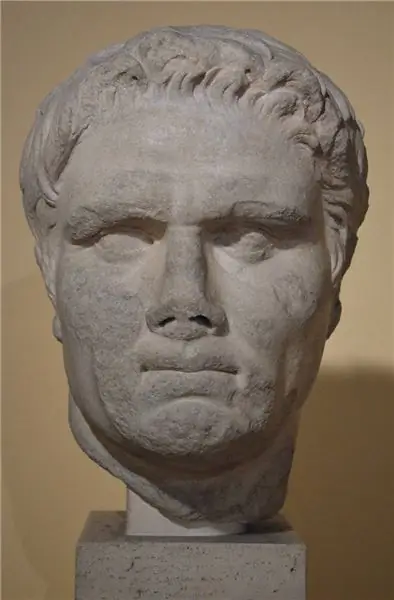
Mark Antony, bust, Montemartini Museum, Rome
Three years later, Ptolemy XII died, he bequeathed his throne to 18-year-old Cleopatra and her 13-year-old brother, who became her husband and king under the name of Ptolemy XIII.
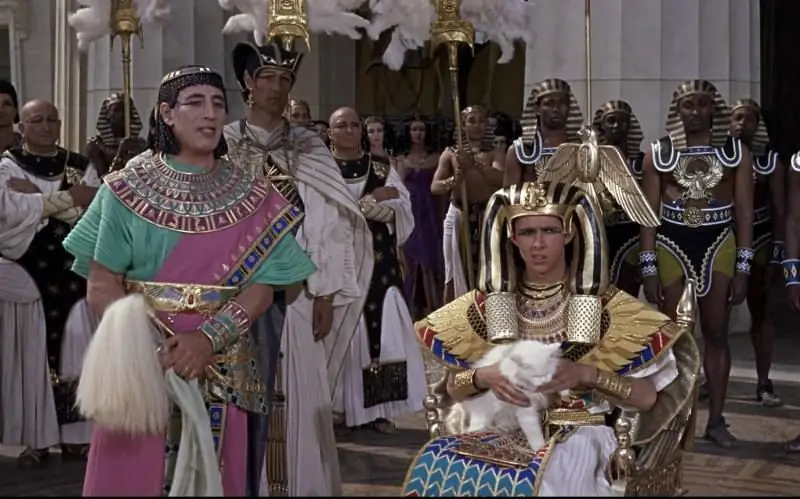
This is how the viewers of the film "Cleopatra" (1963, Richard O'Sullivan as Ptolemy) saw Ptolemy XIII.
In the frame, we see not a fair-haired Macedonian, as Ptolemy should have been, but a typical Egyptian, and even with obvious signs of degeneration on his face (you immediately begin to sympathize with the "beauty" Cleopatra, forced to live with this "monster"), people appear the same from his entourage. But, look at what Ptolemy XIII actually looked like:
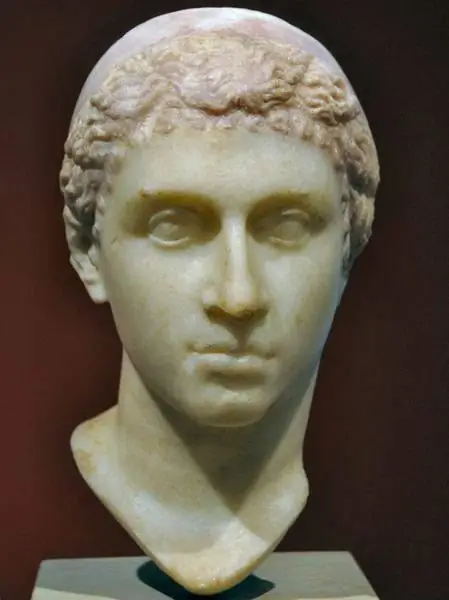
Ptolemy XIII, bust, Altes Museum, Berlin.
A handsome and quite intelligent-looking young man, isn't that so? If you put the busts of Ptolemy XIII from the Old Museum of Berlin and Cleopatra VII from the Vatican next to each other, the external similarity is simply striking, it immediately becomes clear that we have close relatives.
Ptolemy XII appointed Rome as the guarantor of the execution of his will, and specifically Pompey the Great, one of the members of the first triumvirate (Pompey, Caesar, Crassus). Ptolemy XIII, in the opinion of his educator, the Greek Potin, was supposed to become (at least for the coming years) a purely decorative figure, he was going to rule the country himself, but, to his great surprise, he found a strong opponent in the person of the elder sister and wife of the new king. But Ptolemy had another sister - Arsinoe, whom he could marry without breaking traditions, so it was decided to kill Cleopatra, inconvenient for everyone. However, Apollodorus, already familiar to us, found out about the conspiracy in time and, together with his ward, fled to Syria, and not empty-handed: they managed to take out a certain amount of gold from Egypt, which was used to recruit mercenaries. In addition, it was decided to seek support from the eldest son of Pompey the Great - Gnaeus the Younger, who was just on a diplomatic mission in Egypt. The son of the triumvir reacted to the acquaintance quite expectedly, and was already ready to interfere in the conflict on the side of Cleopatra, but in 48 a civil war began in Rome, and Gnaeus was not up to Egypt. When the army of Pompey the Great was defeated by Caesar's troops at Pharsalus, the friend and executor of the father of the warring spouses fled to the galleries in Egypt and turned to Ptolemy XIII with a request for asylum. The young tsar's advisers faced an almost insoluble task: to refuse Pompey meant to turn him into a dangerous enemy, and to accept was to challenge the defeated Julius Caesar. As a result, Pompey, who trusted the Egyptians, was killed and his head was presented to Caesar, who, to the surprise of the king's advisers, was not at all delighted with such a gift. Upon learning of Caesar's arrival in Alexandria, Cleopatra decided, by all means, to meet with him, and since all approaches to the capital from land were blocked by the troops of Ptolemy XIII, she went there by sea. Moreover, the famous scene in which Apollodorus brings her into Caesar's chambers in a rolled-up carpet is not at all an invention of the writers of the plays: it was about the life and death of the queen, and this was the only way to get into the palace. Caesar was 53 years old, a very dangerous age for men beginning to grow old: he had no chance to resist Cleopatra. But not everything was so simple, here is what Dio Cassius ("History") tells about further events:
"When Ptolemy learned about Cleopatra's appearance in the palace and Caesar's intention to protect her, he began to shout that he was betrayed, in front of the gathered crowd, he tore off the royal tiara from his head and threw it to the ground. The rebellious Egyptians could immediately seize the palace, since The Romans, believing that they were among friends, were not ready to attack. The frightened Caesar succeeded by promises to fulfill all the requirements of the Egyptians to calm the crowd. Referring to the will of the former king, he handed over the kingdom to Ptolemy and Cleopatra so that they marry, and Arsinoe and Cyprus gave Ptolemy the Younger ".
"Gave", of course, is loudly said: in fact, he returned to Egypt the island previously captured by Rome.
However, Caesar was not used to being defeated: Ptolemy XIII soon "drowned", and Cleopatra "married" another brother, who was only eleven years old. But the sympathy of the people and the Egyptian army, outraged by the willfulness of the Romans, were on the side of Cleopatra's younger sister, Arsinoe, who was proclaimed queen. This is how the war that lasted for 8 months began, during which the famous Alexandrian library was burned down. After the victory, Caesar and his ward traveled along the Nile, enjoying love, glory and divine honors. But in Asia Minor, the rebellion of Pharnaces, the son of the king of Pontus Mithridates, broke out, whom Caesar once defeated in one battle - remember: "I came, I saw, I won." Caesar again had to fight in the Black Sea region, and then he was forced to go to Africa, where Scipio and Juba tried to gather supporters of Pompey. Finally returning to Rome, Caesar celebrated four triumphs in a month, and among the captives that followed his chariot was the unfortunate Arsinoe. After that, he sent to Alexandria an official invitation to the "Nile sovereigns" to come to him to grant them the title of "friends and allies of the Roman people." In November 46 BC. Cleopatra arrived in Rome, amazed everyone with wealth and luxury.
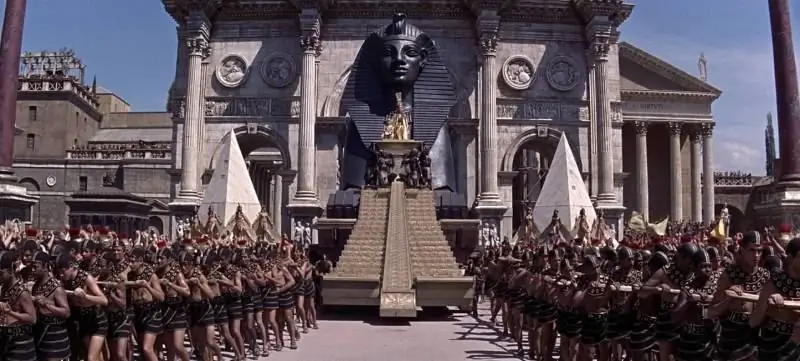
The Queen of Egypt arrives in Rome - Elizabeth Taylor as Cleopatra, 1963 film. Next to Cleopatra, we see her son, Caesarion, who will be born only after a year and a half.
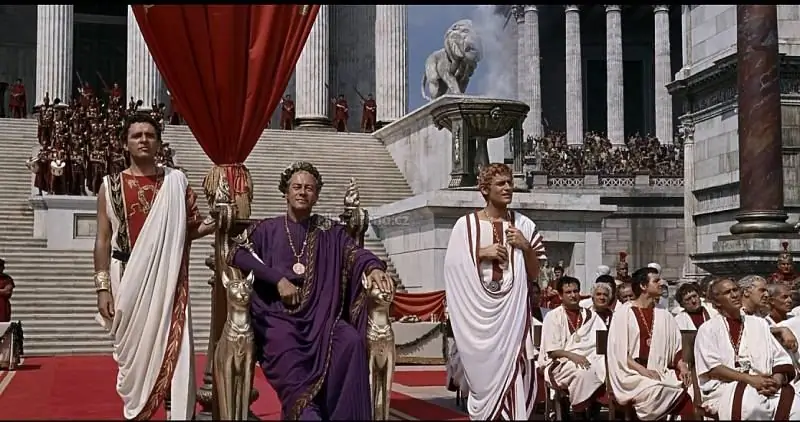
Caesar meets Cleopatra in Rome. R. Harrison as Caesar and R. McDowell as Octavian in the film Cleopatra, 1963
But already in December of this year, Caesar went to Spain, where Sextus Pompey revolted. During this expedition, which lasted for several months, the dictator fell in love with the wife of the king of Western Mauritania, a young Greek woman, Enoe, and lost interest in Cleopatra. At this time, the queen was often visited by Mark Antony, who fell out of favor and removed from command of the troops. So historians are still unclear who exactly became the father of the born in April 44 BC. son of Cleopatra - Ptolemy Caesar, who was often called Caesarion.
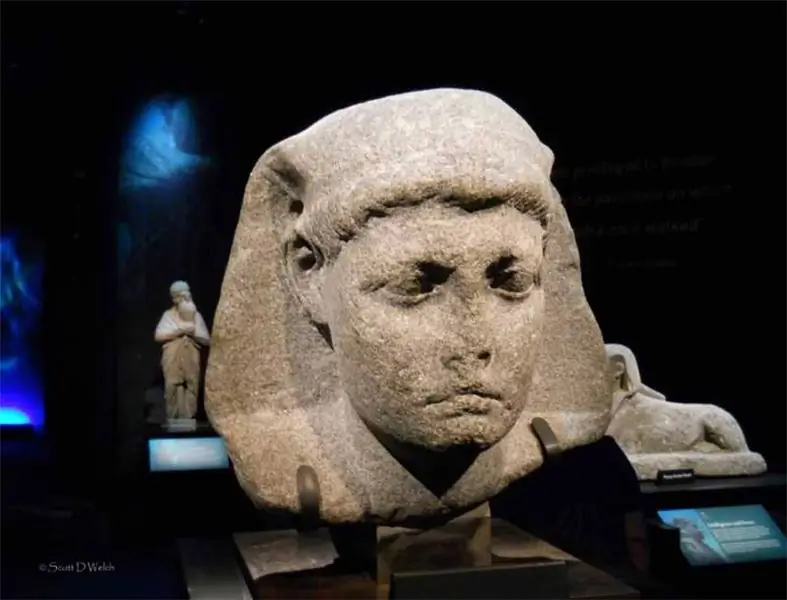
Caesarion, Cincinnati Museum Center
This child was born in Alexandria, where Cleopatra fled after the assassination of Caesar (March 15, 44 BC).
After the division of the empire, Mark Antony got the rich East, which, on the one hand, testifies to the high authority enjoyed by this commander in the army, and on the other hand, to his not too high popularity among Roman citizens. Plutarch reports:
The warriors immediately fell in love with Anthony, who spent a lot of time with them, participated in their exercises and gave them gifts according to his abilities, but many other people hated him. Out of his carelessness, he was inattentive to the offended, listening to petitioners, he was often irritated and used the shameful glory of an adulterer. It should be noted that the power of Julius Caesar, which, since it depended on himself, did not in any way resemble tyranny, was defamed through the fault of his friends;
"Anthony was distinguished by excessive innocence, blindly trusting others. In general, he was a simpleton and a hard-thinking and therefore did not notice his mistakes for a long time, but once he noticed and realized, he violently repented, rewards, not punishments. However, it is easier to overstep the measure, rewarding than punishing."
Among other things, the treaty of triumvirs provided for the "exchange of sacrifices": Octavian sacrificed Cicero, Lepidus - his brother Paul, Mark Antony - Lucius Caesar, his uncle on the mother's side.
Later, Octavian said about Cicero: "The scientist was a man, which, it is true, is true, and he loved the fatherland."
Antony, on the other hand, put the severed head of Cicero on the table during feasts.
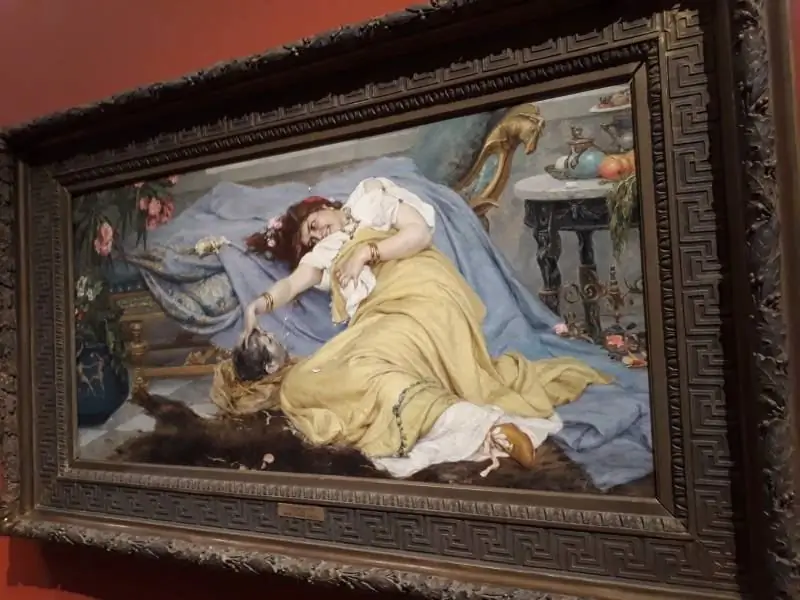
Pavel Svedomsky, "Fulvia (wife of Mark Anthony) with the head of Cicero", Russian Museum
After leaving for the East, Mark Antony had fun in the city of Tarsus (modern Tarsus, Turkey). Here he received reports that Cleopatra allegedly supported Caesar's assassins hiding in Macedonia (who in fact had already died), and that she had poisoned her brother-husband (which was true).
This information came in handy: Anthony used it as an excuse to summon Cleopatra - ostensibly in order to demand an explanation from her. The arrival of the Queen of Egypt made a huge impression on the Romans: she appeared on a ship decorated with gold with purple sails and silver oars. Slaves rowed to the sound of flutes, lyres and flutes, incense was smoking on the deck, and half-naked girls walked among the crew members. The deck of the ship was strewn with a thick layer of rose petals, the food was exquisite, the queen was charming. Based on ancient sources, W. Shakespeare gives the following description of Cleopatra's arrival:
Her ship is a radiant throne
Shone on the waters of Kidna. Flamed
From hammered gold feed.
And the sails were purple
Are filled with such a fragrance
That the wind, melting with love, clung to them.
Silver oars in tune with the singing of flutes
Crashed into the water that flowed after
In love with these touches.
There are no words to depict the queen.
She is more beautiful than Venus herself -
Although that one is more beautiful than a dream, -
Lay under a brocade canopy
Standing at the bed, handsome boys, Like laughing cupids
With a measured variegated fan
A gentle face was wrapped around her, And that is why his blush did not fade, But it flared up brighter.
Like the merry Nereids, Her handmaidens, bowing to her, Catching with adoration the look of the queen.
… Intoxicating aroma
It poured onto the shore from the ship. And people
Leaving the city, they rushed to the river."
Antony did not ask Cleopatra the questions for which he summoned her. Falling in love with her again, he ordered to strangle Cleopatra's rival, Arsinoe, who had fled from Rome, and when the queen suddenly sailed to Alexandria, he followed her. The "sweet life" of the Triumvir in Egypt lasted 18 months. Cleopatra's feasts were proverbial, but if historians are to be believed, sometimes she and Antony would dress up in the costumes of commoners and go to the port taverns. These adventures sometimes ended in fights, in which the ruler of the East was sometimes beaten, but he proudly declared that, never in such alterations, he had not allowed his companion to offend. This is how Antony W. Shakespeare describes this period in his life:
His occupation is fishing
Yes, noisy drinking parties until the morning;
He is no more courageous than Cleopatra, Which is not more feminine than he …
Stagger through the streets in broad daylight
And start fist fun
With a stinking rabble."
And in Rome at this time there was a fierce struggle for power between Octavian and the supporters of Anthony, led by the wife of the absent triumvir - Fulvia. Political battles escalated into a civil war, Octavian and the commander Marcus Agrippa besieged Anthony's brother Lucius in the fortress of Perusia.
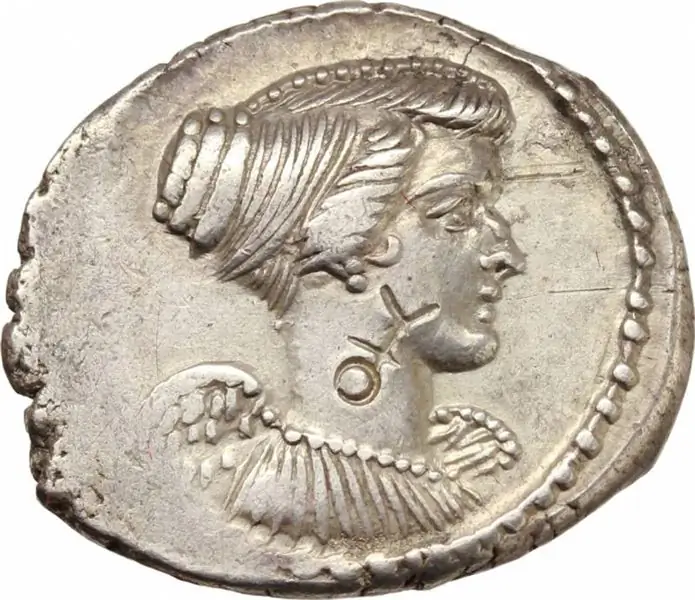
Denarius 42 BC with a portrait of Fulvia, minted during the Perusian War, which Lucius Antony and Fulvia waged against Octavian
Having received no help, Lucius, after a 5-month siege, surrendered to Octavian, and Fulvia fled to Greece. All this forced Mark Antony to leave Cleopatra for a while and go to save his fate. When he met his wife, he told her about the final breakup. Shocked by this betrayal, Fulvia fell ill and soon died. A clash between Octavius and Mark Antony seemed imminent, but veterans in both armies recognized and greeted each other, causing their leaders to lose confidence in the outcome of the battle. It now seemed almost impossible to start a battle. As a result, Octavian offered to make peace. Mark Antony was also not eager to fight and easily agreed to the offer of his opponent. As a sign of reconciliation, the widowed Anthony in 40 BC. married the sister of his rival - Octavia.
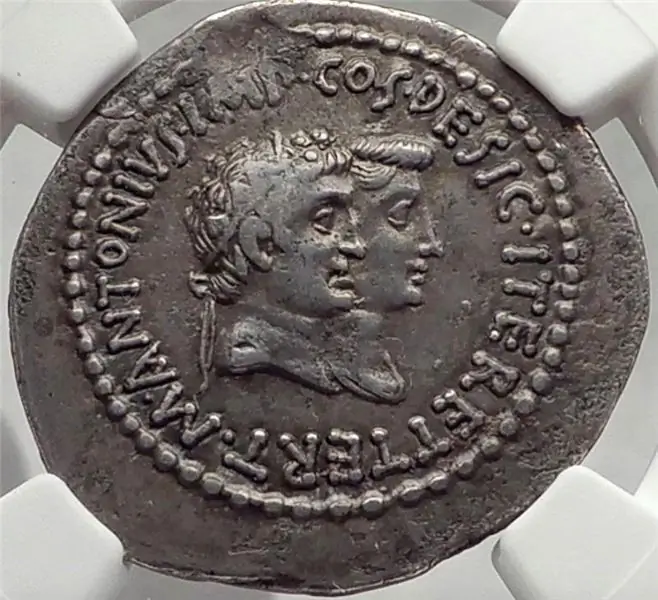
Mark Antony and Octavia, silver tetradrachm
From this marriage, two girls were born - Antonia the Elder and the Younger (it is interesting that one of them became Nero's grandmother, and the other became Caligula's grandmother).
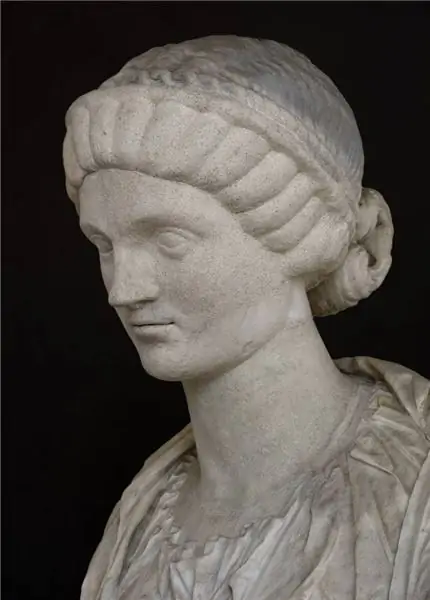
Anthony the Younger, bust, Roman National Museum
Cleopatra has twins at this time - the girl was named Cleopatra Selena, the boy - Alexander Helios.
In 37 BC. year, the triumvirs agreed on the mutual recognition of their powers for another 5 years and even tried to exchange troops: Octavian received 120 ships for the war with Sextus Pompey, promising in return 4 legions for Antony's war with Parthia (Antony did not wait for these legions from him).
The boring family life in Rome soon bored Antony, under the pretext of a war with Parthia, he left Octavia and went to Antioch. He had been absent from Alexandria for three years, during which time he did not send a single letter to Cleopatra, the offended queen even forbade to pronounce his name in her presence. The more offensive was the official summons to Antioch. Cleopatra restrained herself, and, as subsequent events showed, her calculation turned out to be correct: their love relationship resumed. In order to make amends, Anthony presented Cleopatra with Cyprus, Crete, the Jordan Valley, Lebanon, the northern part of Syria and the city of a memorable meeting - Tarsus. Only three months later, Anthony went to war with Parthia, while Cleopatra, after this meeting, gave birth to a boy who was named Ptolemy Philadelphus.
The Parthia of those years was a terrible enemy, but it, like a magnet, attracted all Roman ambitious people. During the campaign to Parthia, Crassus died and destroyed his army. Now Mark Antony was to fight the Parthians. The reason for the war was the attacks of Parthia on Judea and Syria. While Antony was negotiating with Octavian and marrying his sister, the Parthian prince Pacorus defeated the governor of Syria, Lucius Decidius of Saxons, captured Antioch and Apamea, almost reaching the border with Egypt. Another army invaded Asia Minor. The personality of its leader is interesting: Quintus Labienus - a supporter of Brutus and Cassius, sent by them to ask for help from the Parthian king Orodes II (the commander of this king, Suren, defeated Mark Crassus in 53 BC - these events were described in the article Parthian the disaster of Mark Licinius Crassus (V. Ryzhov)
The beginning of the Parthian campaign was successful for the Romans. In 39-38. BC. Anthony's legate Ventidius Bass first defeated the allied troops of the Parthians and Quintus Labienus, in this battle the Parthian commander Farnapat died. Then the army of the Parthian prince Pakorus was defeated, who also fell in battle - on the same day that Mark Crassus was killed 15 years ago. As a result, the Parthians were forced to leave Syria. These defeats led to a mutiny and the assassination of Orod II by his stepson, who ascended the throne under the name Arshak XV.
In 36 BC. the troops of Mark Anthony himself, in whose army there were 16 legions, detachments of the Spanish and Gallic cavalry, 6 thousand Armenian horsemen and up to 7 thousand Armenian infantrymen, had already moved on the campaign. Unlike Crassus, Antony moved to Parthia not from Carr, but through Armenia. He left the siege engines that slowed the advance of the main forces far behind, instructing them to guard the ten thousandth detachment of Oppius Statsian. The Parthians, in the style of the victorious Crassus Surena, defeated Statian's corps (who was killed) and destroyed the siege weapons. As part of this detachment were the troops of Pontus, allied to the Romans, whose king, Polemon, was captured (later he was released for a large ransom). This failure, which showed that the strength and fighting spirit of the Parthians were not broken, led to the fact that the Armenian king Artavazd refused to march. Anthony, having lost his siege weapons, was stuck at the walls of the capital of Media - Fraaspa. His army soon began to lack food, the foraging teams were exterminated by the Parthians, the inhabitants of the besieged city also sometimes successfully attacked the Romans who were building the embankment in front of the walls, once putting them to flight - Antony, in a rage, resorted to decimation: he sentenced every tenth of the escaping soldiers to death. The Parthians, evading a decisive battle, constantly attacked the rear and communications of the Romans. With winter approaching, Anthony gave the order to return to Syria, and this retreat was truly terrible for his army: the Parthian cavalry constantly attacked, cutting off and exterminating the lagging units. Once Anthony had to personally, at the head of the III legion, make his way to the aid of the encircled detachment of Flavius Gallus: only during this local battle 3 thousand Romans died and 5 thousand were wounded. The retreat from Fraaspa to the Armenian border lasted 27 days, during which the Parthians attacked Anthony's army 18 times, the total losses of the Romans amounted to about 35 thousand people. At the end of this path, the Roman army presented a pitiful sight, the soldiers fought for a piece of bread and a bowl of water, once even attacking the porters of their commander. The situation was so dire that Mark Antony turned to one of the freedmen with a request to kill him if he ordered. The misadventures of the Romans did not end after reaching Armenia: on the way to Syria, they lost another 8 thousand people from hunger and cold.

Failing to succeed in the war with Parthia, Anthony decided to punish Armenia, whose king he declared the culprit of his defeat. The following year, in alliance with the Medes, Anthony attacked Armenia. Tsar Artavazd II was treacherously captured during negotiations (he will be executed by the Romans in three years), his capital Artashat was plundered. It was after this campaign that Cleopatra was proclaimed the queen of kings, her son Caesarion - the king of kings. Mark Antony divorced Octavia and married the Queen of Egypt, celebrated his triumph not in Rome, but in Alexandria. All this caused great displeasure and irritation in his homeland, where the offended Octavian officially declared him an enemy of the Republic and the Roman people. Now the war between them is becoming almost inevitable, the only question is who will prepare faster and better for the outbreak of hostilities. For 5 years, Antony and Cleopatra have been building ships in the shipyards of Greece and Syria. At the same time, traditional ships were built for Cleopatra's fleet, and Anthony's ships were floating fortresses with metal rams, towers and ballistas.
There were a lot of mutual claims at this time, but perhaps the most painful for Octavian were accusations of usurping Caesar's name (after all, he himself was only adopted) and claims on behalf of Caesarion for his role as head of the Caesarion party.
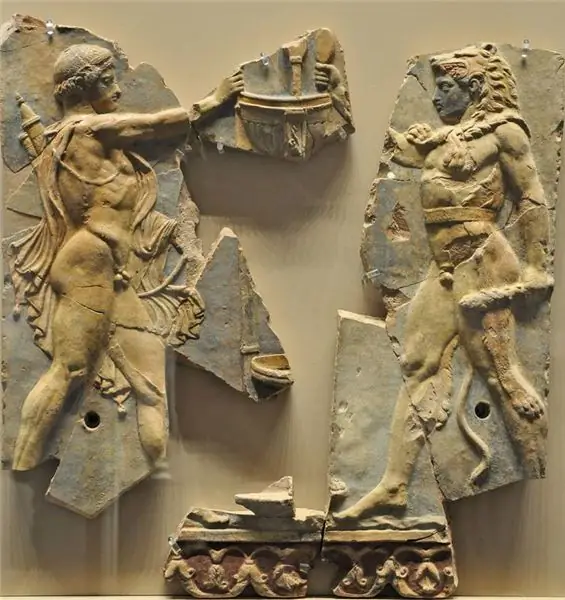
A symbolic depiction of the conflict between Octavian, whose divine patron was Apollo, and Antony, descended from Hercules. Palatine Museum, Rome
In December 33 BC. the powers of the triumvirs (both Antony and Octavian) were expiring, and therefore Antony sent a letter in advance to the Senate of Rome, in which he promised to relinquish power if Octavian did the same. In 32, he assured the Senate that after defeating Octavian, he would relinquish power within 60 days. Antony's actions seemed to many to be more legitimate than those of Octavian, and in the same year both consuls and part of the senators fled to Antony. As a result, Mark Antony could rely on his "own" Senate, which was even more legitimate than the Roman one. But Antony's Italic and Roman allies demanded the removal of Cleopatra, which he was unable to do - not only because of the great love for her, which, perhaps, no longer existed, but mainly due to the great dependence on the resources of Egypt. The denouement came when Octavian, contrary to all laws and traditions, achieved the promulgation of the testament of Mark Antony kept in the temple of Vesta, in which he asked to be buried in Alexandria and declared Caesarion to be the only heir of Julius Caesar. The Romans were indignant, suspecting that their city and all of Italy would be given to Cleopatra, and the capital of the republic would be moved to Alexandria. Meanwhile, Octavian found himself in a difficult situation: the war with Antony would have been perceived by everyone in Rome as a civil war, and the Romans had not yet forgotten the calamities of the previous internecine wars. I had to declare that Rome is in a state of war only with Cleopatra (the reason for her was the appropriation of the "heritage of the Roman people" - the territories donated to her by Anthony), while hinting about the limited legal capacity of Mark Antony:
"It was decided to start a war against Cleopatra and deprive Antony of the powers that he gave up and handed over to the woman. To this Caesar added that Antony was poisoned by poisonous potions and no longer possesses either feelings or reason, and that the war would be led by the eunuch Mardion, Potin, Cleopatra's slave Irada, who removes the hair of her mistress, and Charmion - that is who manages the most important affairs of the government "(Plutarch).
Thus, the "right of the first move" in the civil war was passed on to Mark Antony: if he still supported Cleopatra with his available forces, he, and not Octavian, would be responsible for civil strife.
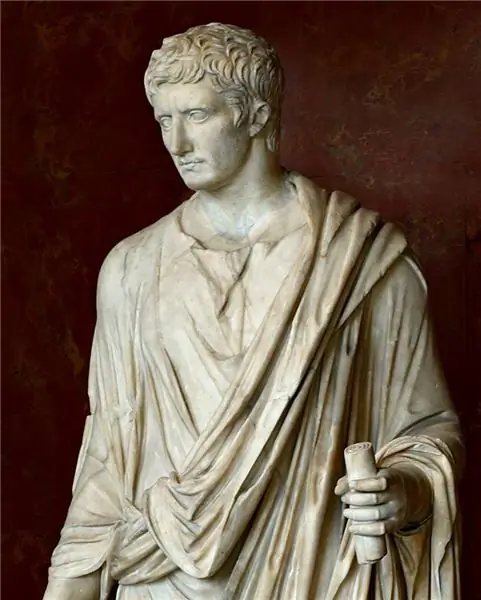
Octavian August, Paris, Louvre
Antony decided to land his troops in Italy, where he still had many supporters, but he wasted time organizing festivities in honor of Cleopatra in Greece. Meanwhile, in the winter of 32-31 BC. his numerous soldiers and sailors experienced difficulties with the delivery of food and were almost starving, illnesses began (some researchers suggest that an epidemic of malaria began in the Anthony camp). The consequence of all these troubles was a massive desertion, so that in the spring of 31 it turned out that the ships were missing about a third of the personnel. Octavian and his commander Mark Agrippa, on the contrary, did a great job of recruiting and training soldiers and sailors, preparing ships for a military campaign. In the spring of 31, he already had an army ready for battle, numbering 80 thousand infantry and 12 thousand horsemen. The Roman Navy by that time consisted of 260 biremes and liburn (a type of bireme, had a closed deck), equipped with various devices for throwing incendiary mixtures.
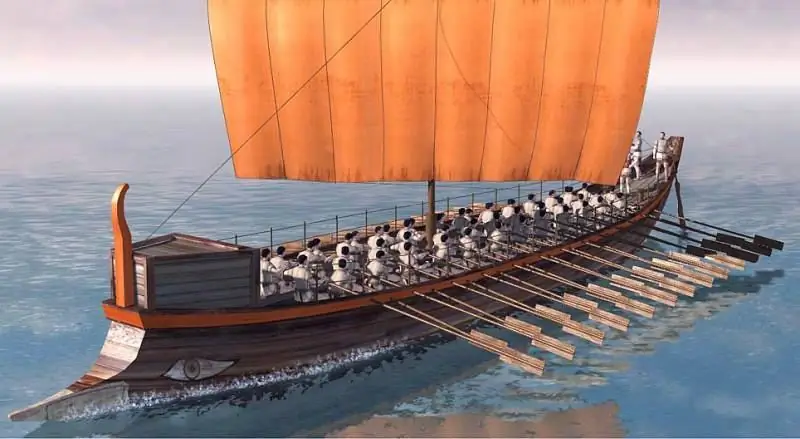
Bireme
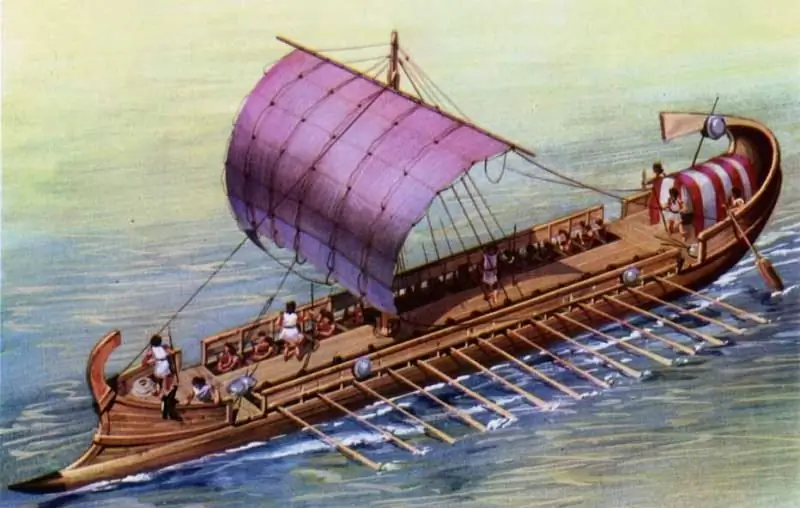
Libourne
Anthony, as we remember, intended to be the first to open hostilities first, landing troops in Italy. And therefore the emergence of the fleet of Octavian, which in the spring of 31 BC. actually blocked his ships in the Ambracian Gulf (western coast of Greece), which came as an unpleasant surprise to him. Antony and Cleopatra had up to 100 thousand infantry, 12 thousand mounted soldiers and about 370 ships at their disposal. Anthony ferried his army to Cape Aktius (Aktius), but did not dare to start a big battle. The "strange war" lasted for 8 months, during which only numerous minor skirmishes took place. The relationship between Antony and Cleopatra became increasingly strained during this time. Antony was inclined to give a general battle on land, Cleopatra was in favor of a battle at sea. In addition, the couple began to share the skin of the unkilled bear and constantly argued whether Antony alone should enter Rome, or Cleopatra should also take part in the triumph. Agrippa, meanwhile, captured the island of Leucadia and the cities of Patras and Corinth, practically cutting off Antony's army from the main supply bases.
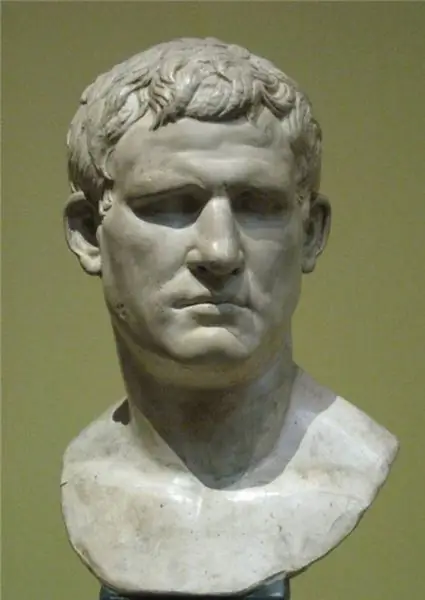
Mark Vipsanius Agrippa, bust, Pushkin Museum of Fine Arts in Moscow
The position of Antony's army was now almost critical, and Cleopatra insisted on returning to Egypt, where there was another army, numbering 11 legions. A retreat by land through the lands already ravaged by a huge army was hardly possible, and therefore a decision was made to evacuate the most combat-ready units of the army by sea. From Antony's fleet, 170 of the best ships were selected, on which 22,000 of the most experienced soldiers were put. In addition, 60 ships of Cleopatra were sent to Egypt. The military treasury was also transferred to the flagship. The rest of the ships were burned, which, in fact, doomed the soldiers left on land to death. Perhaps these units were already an armed and poorly controlled crowd, and Mark Antony, like Napoleon at the Berezina, did not consider it necessary to save them at the cost of the death of the elite formations. All this suggests that the main goal of Anthony in the famous battle at Cape Aktius (which is considered to be the last great naval battle of Antiquity) was not a victory, but an attempt to break through from the coast of Greece to Egypt. On the eve of the decisive battle, two captains Anthony deserted, who told Octavian about his plans. No less important events took place in the camp of Anthony: on the night from the first to the second of September 31 BC. in the presence of numerous guests, Cleopatra handed her husband a goblet of wine, throwing there a flower that adorned her hair. At the last minute, she threw the goblet on the floor, announcing that the flower had been poisoned, while declaring that it would cost her nothing to get rid of Antony at any moment. After this quarrel, the ships of the Egyptian fleet were ordered to enter the battle only on a special signal. As a result, 170 ships of Anthony were forced to engage in battle with the superior forces of the Romans - 260 ships.
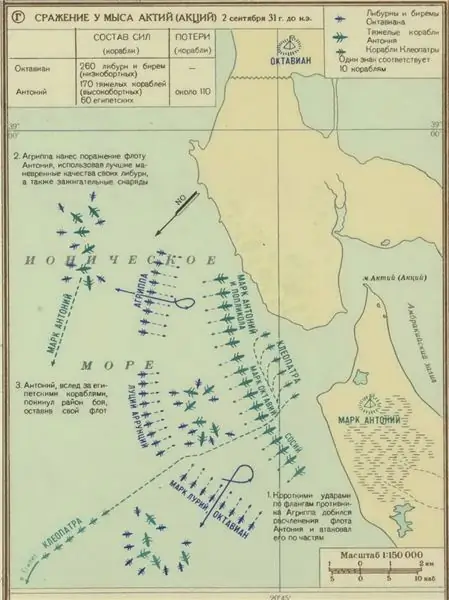
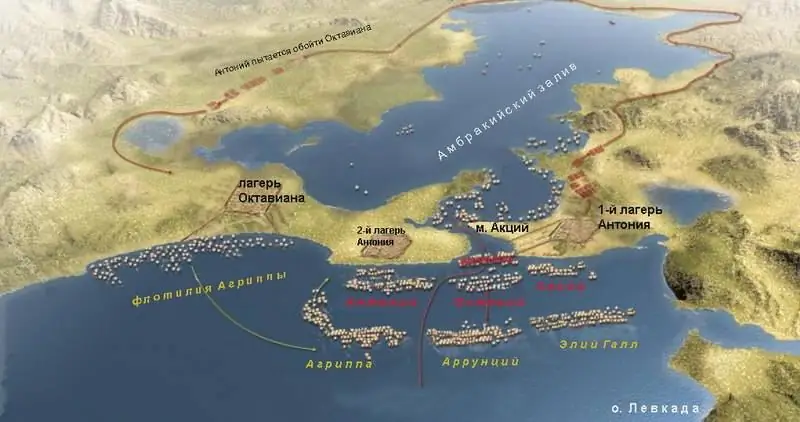
In the naval battle that began, the tactics of the opposing sides were as follows: Anthony's ships tried to ram the lighter ships of Octavian and Agrippa, the Romans showered them with incendiary shells from catapults and ballistae and tried, approaching enemy ships, to transfer the battle into a boarding battle, in which the well-trained crews of Octavian had the advantage.
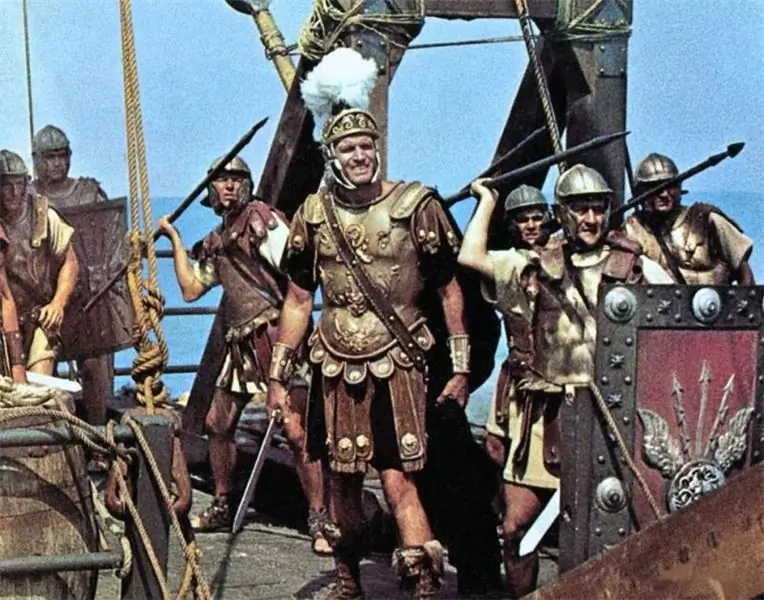
Richard Burton as Mark Antony at the Battle of Cape Share, 1963
Following the approved plan, the vanguard and part of the ships of the center of Anthony engaged in battle with the Roman ships, while the rest set sails and went to sea. It was possible to break through about a third of Antony's ships, followed by lighter and more maneuverable Egyptian ships. Plutarch reports:
"The battle became general, but its outcome was still far from definite, when suddenly, in plain sight, sixty ships of Cleopatra set sail and fled, making their way through the midst of the fighting, and since they were stationed behind the large ships, but now, breaking through their line, they sowed confusion. And the enemies only marveled, seeing them, with a favorable wind, go to the Peloponnese."
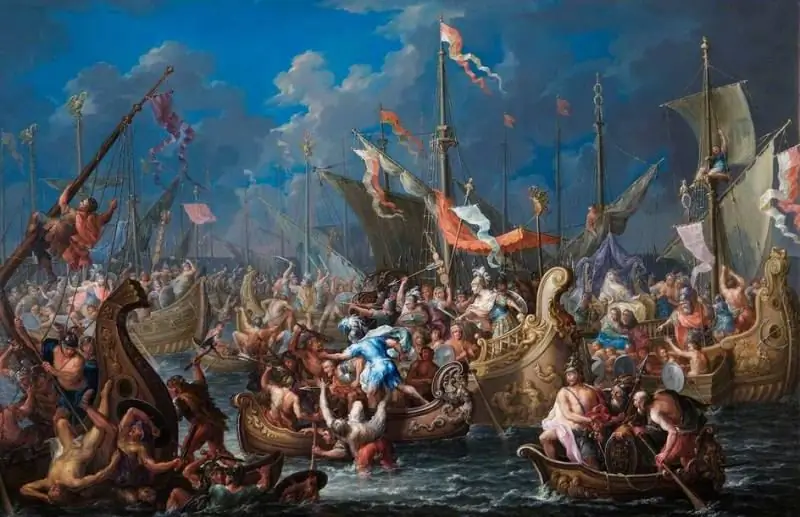
Johann Georg Platzer, Antony and Cleopatra, Battle of Cape Share, English Heritage, The Wellington Collection, Apsley House
Mark Antony, jumping into a light galley, followed Cleopatra, without transferring command to anyone.
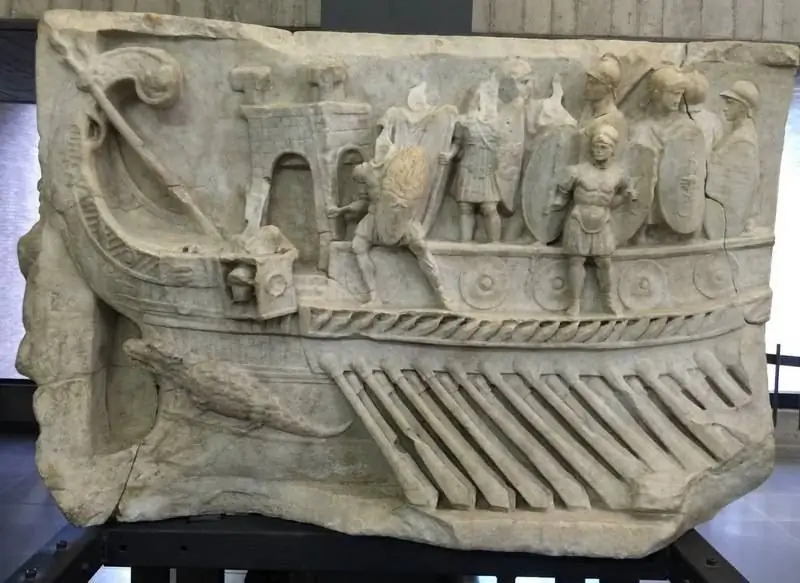
Monument in Preneste in honor of the victory at the Action, Vatican Museum
Traditionally, it is believed that the flight of the Egyptians led to panic on the ships of Anthony that continued to fight. But Antony's ships fiercely defended themselves for several hours, and some of them for two more days. And for 7 days the army, which he left on the shore, was waiting for its leader. Plutarch reports:
"Few saw Anthony's flight with their own eyes, and those who found out about it, at first did not want to believe - it seemed to them incredible that he could abandon nineteen untouched legions and twelve thousand cavalry, he, who had experienced both the mercy and disgrace of fate on himself so many times and in countless battles and campaigns, who recognized the capricious fickleness of military happiness. The warriors yearned for Anthony and everyone hoped that he would suddenly appear, and at the same time showed so much loyalty and courage that even after the flight of their commander did not cause the slightest doubt, for seven whole days they did not leave their camp, rejecting all the proposals that Caesar made to them."
However, modern researchers are skeptical about this testimony of Plutarch, believing that, in fact, the legionnaires did not wait for Antony, but were actively bargaining with Octavian, and were very successful in this occupation: those who wanted to continue their service were accepted into his army, veterans received land in Italy or the provinces.
One way or another, many considered Antony's behavior in that battle to be cowardly, and the cynicism shown in relation to the abandoned army bordering on betrayal. Shakespeare ascribes to Octavian, who learned about Antony's death, the following words:
It cannot be. The collapse of such a bulk
The universe would be rocked with a crash.
The earth should have shuddered
Throw into city streets
Lviv from the deserts and throw the townspeople
To the lions' caves. His demise
Not just human death.
Indeed, the name "Anthony" contained
Half the world."
In fact, then a disgraced, mortally tired man returned to Alexandria, who will never become the former Mark Antony. His military reputation was irrevocably lost, this was well understood by both enemies and allies. Therefore, Octavian did not need to express himself so pathetically.
Six months later, an ambassador from Octavian arrived in Alexandria. He offered Cleopatra life and even the throne of Egypt, but demanded the head of her husband. Suspecting that Octavian wants to destroy Antony with her hands only so that later, using any insignificant reason, to deal with her herself, Cleopatra did not answer yes or no, and was playing for time. And Mark Antony, completely discouraged, promised to give up everything if he was allowed to live as an ordinary citizen in Alexandria or Athens. Anticipating death, Cleopatra ordered the finishing of her mausoleum, built next to the palace, to be completed. At the end of July 30 BC, when the troops of Octavian entered the territory of Egypt, Antony nevertheless came out of his torpor. On July 31, he won his last victory: he attacked and defeated Octavian's cavalry. Inspired by success, on August 1, he sent the Egyptian fleet into the sea and saw how it surrendered to the enemy without a fight. The victorious cavalry moved forward without orders and laid down their arms. It was all over.
The significance of the defeat of Cleopatra and Antony and the annexation of Egypt to Rome (30 BC) is such that these events are traditionally considered the end of the Hellenistic era.
But the main characters of this tragedy were still alive. Confident of his wife's betrayal, Anthony returned to the palace. Cleopatra, having learned about the betrayal of the army, hid with two mausoleums in the mausoleum (we have already heard their names in Plutarch's testimony - "Irada, removing her mistress's hair, and Charmion"). Antony, on her orders, was informed that his wife had committed suicide and he, who had just killed Cleopatra, was suddenly seized with despair. He asked his beloved slave named Eros to kill him, but he pierced himself with the sword. Antony's suicide attempt was less successful. Badly wounded, Anthony asked the servants to finish him off, but they fled from him in fear. Finally, the messengers of Cleopatra appeared - confident in the death of her husband, she sent them for his body. With the help of ropes, Anthony was lifted on a stretcher into the mausoleum through the window of the second floor. Here he died in the arms of Cleopatra, and for another month she negotiated with Octavian in the ghostly hope of keeping the throne of Egypt for her children. Having collected the treasures of Egypt in her tomb, Cleopatra vowed to burn them if Octavian did not forgive her, and the winner, who had counted on rich trophies in advance, had to reckon with these threats. But the Roman officer who guarded her, Cornelius Dolabella (who fell in love with her and informed about Octavian's intentions), said that Octavian would kill all her children if he lost his prey. And the fate of the eldest of them, Caesarion, has already been decided - he will be killed in any case. The queen herself is needed by Octavian only as a trophy - she will be led in disgrace through the streets of Rome. It was then that Cleopatra made her choice between death and dishonor. Having lost hope, Cleopatra went down to the cellars at night, where she tested various poisons on the slaves. "Experiments" convinced her that the most painless death is from the bite of an Egyptian asp: it does not cause suffering, the person quickly falls asleep and does not wake up.

Egyptian viper (Cleopatra's snake, Gaya). It is his image that can be seen on the foreheads of the pharaohs as a symbol of power and authority. According to Elian's story, the gays lived in the houses of the Egyptians, who believed that these snakes could only bite evil people, but never harm the good ones. With the clap of their palms, these snakes were called to dinner, in the same way they were warned of their approach (so as not to step). Death from the bite of this snake occurs within 15 minutes.
By order of Cleopatra, one of these snakes was brought to her in a basket of figs.
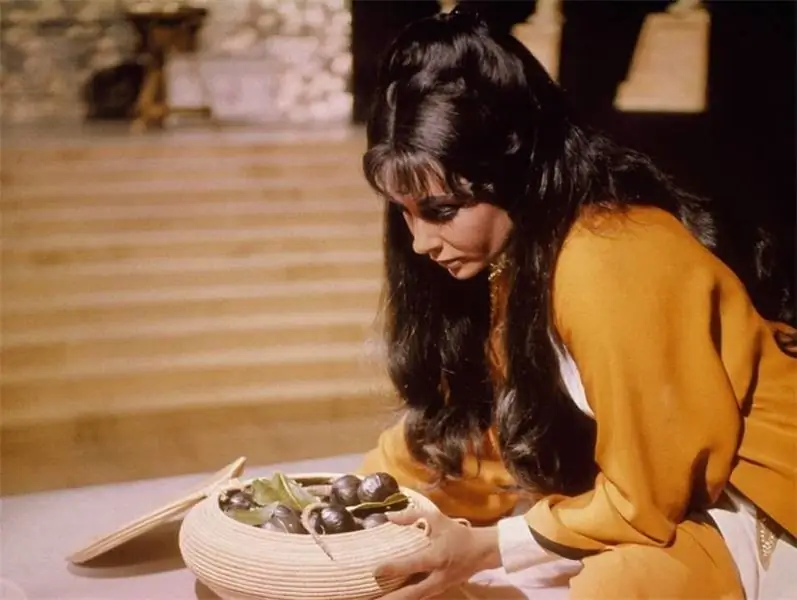
A basket with figs and a snake, the film Cleopatra, 1963
Dressed in festive clothes, the queen woke up and angered the snake with a needle prick. Irada and Charmion followed suit. The death of Cleopatra became the subject of numerous paintings by the masters of the Renaissance, but not all of them correctly represented the circumstances of her death. Here are some of these pictures:
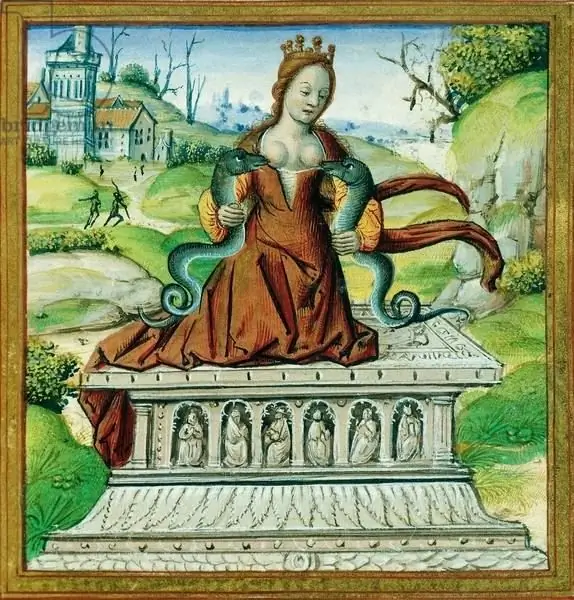
The suicide of Cleopatra by two snakes, miniature in a manuscript of 1505, Nantes, France

Andrea Solari (Solario) (1460-1524) Cleopatra
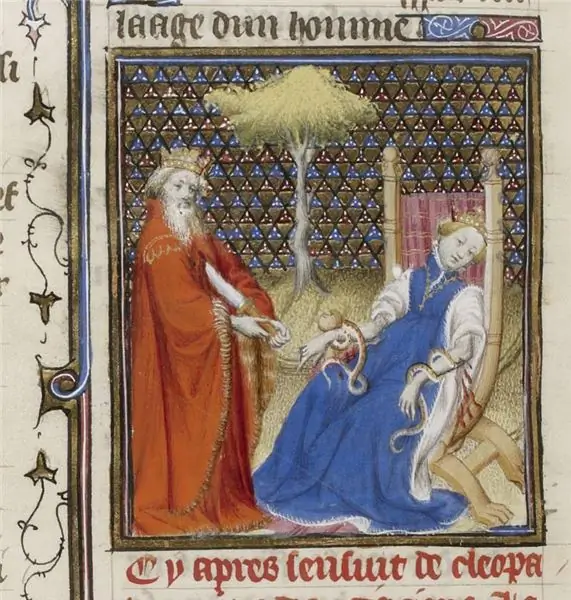
Giovanni Boccaccio "About famous women", First quarter of the 15th century. Again, pay attention to the hair color: this is how it should have been in a Roman woman of noble birth. Michelangelo (pictured above) and Boccaccio forget that Cleopatra was Macedonian.
So at the age of 38, the omnipotent queen of the East died quite recently. In the last message of Cleopatra to Octavian there is only one phrase: "I want to be buried in the same grave with Antony." Octavian, before the campaign publicly promised to arrange a triumphal procession in Rome with the queen of Egypt, tied to his chariot, got out of the situation, ordering to chained to her a golden statue of Cleopatra, which he dragged along the ground. Caesarion and Anthony's son Antullus from Fulvia, in whom Octavian saw contenders for power in Rome, were executed. The rest of the children of Antony and Cleopatra were raised in his family by his ex-wife Octavia, the winner's sister.
This is the finale of one of the most romantic stories that humanity has known.






